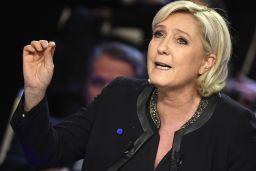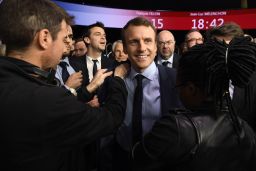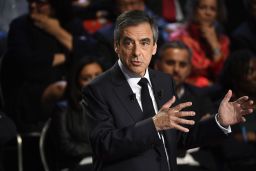Falls from grace, sudden departures and unlikely stars; France’s presidential election has been packed with dramatic moments and episodes.
Here’s what you need to know about the election campaign, which has featured as many twists and turns as a soap opera, as the round one vote nears.
The original cast

Francois Hollande: The current President – a Socialist and stalwart of the French political landscape. Hollande announced his plans to step out of the limelight early in the campaign.
François Fillon: The surprise winner of the Republican primaries quickly took on the status of the leading man, but has since seen his popularity plummet thanks to a series of scandals.
Marine Le Pen: A longtime bit part player in French politics, the far-right Front National leader has risen to the role of leading lady in recent months.
The rising star
Emmanuel Macron: The new kid on France’s political block has never been elected to political office, but was an appointed minister under Hollande. A centrist with no established party, the candidate who married his former teacher more than 20 years his senior, looks set to make it through to the second round, despite his inexperience.
The scene stealer
Penelope Fillon: Wife of Francois, she looked set to star in the role of France’s First Lady – until she became embroiled in a financial scandal that will likely cost her husband top political billing.
The supporting cast
Manuel Valls: The former Prime Minister was expected to play a starring role for the Socialist party, one of the two parties that have dominated French politics for decades, but after losing out to party rebel Benoît Hamon, he announced plans to support Macron instead.
Jean-Marie Le Pen: Founder of the Front National and one-time bête noire of French politics, has been relegated to a minor role following his daughter’s takeover of the party.
Nicolas Sarkozy: The embattled ex-President had hoped to stage his political comeback, but made an early exit in the first round of the Republican party primaries.
A recap of the campaign to date

Aged just 39, and with no established political party behind him, Macron and his “En Marche!” (Progress!) movement were initially easy to dismiss: ex-Prime Minister Manuel Valls labelled him “populism light.”
But a series of scandals involving the other candidates meant Macron is now center stage, with the keys to the Elysee Palace at his fingertips.
Fillon, the one-time leading man, has fallen spectacularly from grace – and in the polls – lurching from one disaster to the next at seemingly breakneck speed.
The 63-year-old Republican’s reputation has taken a hammering since allegations surfaced that he paid his wife and children for parliamentary work they did not do.
Fillon faced calls to withdraw from the presidential race, but has remained defiant, even after prosecutors said they would be investigating him over the “fake jobs” scandal, as well as over allegations he received expensive suits as a gift.

Fillon has denied all the allegations, and taken aim at the media and his opponents, but that hasn’t stopped him from slipping down the polls.
As Fillon’s stock has plummeted, Macron’s has gone up – despite him having to dismiss allegations of an extra-marital affair and apologize for condemning France’s colonial past in Algeria, according to Reuters.
Now it seems the only obstacle in his way is far-right National Front leader Le Pen.
But Le Pen has her own problems.
Read more: Why Europe is happy gambling with its politics
She is already under scrutiny after members of her staff were accused by officials of being paid for non-existent jobs at the European Parliament.
She initially admitted they had been paid while not working, the European Anti-Fraud Office (OLAF) said. She later denied having said so.
Le Pen’s fractious relationship with Europe was further exacerbated when European lawmakers voted to rescind her parliamentary immunity over a case involving violent images she posted on Twitter.
An inquiry was opened under a French law banning the distribution of violent images, after Le Pen tweeted images of killings by ISIS militants in December 2015.
And Le Pen’s attempt to persuade voters that her party has changed was dealt a blow in March, when one of its counselors was suspended over allegations of Holocaust denial, after he was caught on camera playing down the systematic murder of six million Jews.
Related: France’s controversial election campaign, explained
Le Pen and Macron are widely tipped to go head-to-head in the second round of voting on May 7, the first round takes place two weeks earlier, on April 23. The two candidates are running neck and neck according to latest polling.
Whatever the final result, it is clear voters want to see a change at the top of French politics, according to Dr Emmanuelle Schön-Quinlivan, lecturer in European politics in the Department of Government at University College Cork.
“This is the election which appears to have brought the Fifth Republic to its knees,” she told CNN.
“People have had enough of the left and right over the past 30 years, it didn’t work. They want to throw the table over and Le Pen and Macron are both options for that.
“Both Macron and Le Pen are bringing something new to the table at a time where the French electorate is disgusted with the political elite – and that’s what stands out in this campaign.”


